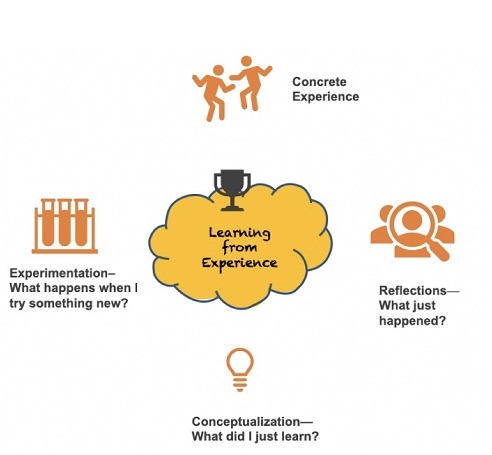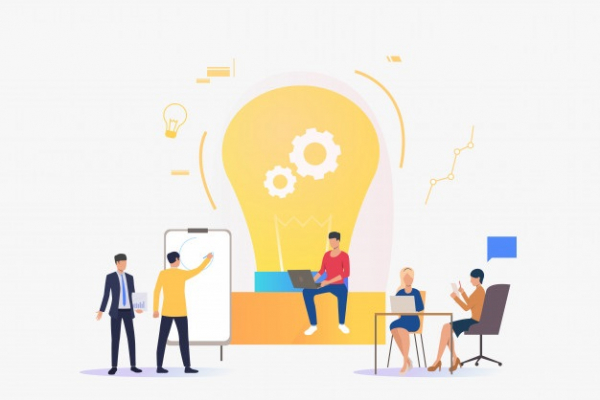Our ability to keep learning is so important that "learning agility" is often rated as one of the most critical qualities that strongly predicts the potential of a business leader.
Many of us imagined that by our twenties, we would be done with needing to be learners. By then we would “know something” of importance and would spend our professional time acting from that knowledge. And of course, as we became even more experienced, we would now guide and mentor others in our team who would do the actual work we used to. But is that true anymore?
In a world that is changing so fast, what we learnt even a few years back needs an update. To give you a sense of how much, consider that the World Economic Forum in their ‘Future of Jobs report 2018’ suggests that on an average, each of us needs an extra 101 days of learning by 2022. That’s almost a month each year! Given that most of us are already in full-time jobs where we feel stretched to our limits and also have many responsibilities at home, this may feel like an overwhelming idea. So here are a few tips and tricks that will help you create the rhythm you need to be a lifelong learner.
(1) Empty Your Cup
You may have heard the story of a Zen scholar who had come to learn from a great Zen master. The scholar had studied for many years and knew many facts. When he went to meet the Zen master, he simply couldn’t help himself from telling the master more and more of what he knew. For a while, the master heard him quite patiently. He then asked him if he would like some tea. The master poured tea into the scholar’s cup. But then, instead of stopping when the cup was full, he kept pouring till tea spilled over and overflowed. “Stop! Stop! Can’t you see the cup is full?” shouted the scholar. The master smiled and replied, “But you are like this cup which is full. When you are already overflowing with knowledge, how can I teach you anything new?” The scholar was at first taken aback, but as he understood what the master was saying, he began to smile. At the heart of a learning mindset is this understanding.
To be a learner, you first have to be able to “empty your cup” or be open to new ways of explaining the world. If on the other hand, you hold on very tightly to your current ideas, chances are you will not be able to learn much that is new and fresh.
(2) Do you have a process for learning? Do you have learning goals?
A recent article in the Harvard Business Review (“Learning Is a Learned Behavior”, Ulrich Boser, May 2018) describes a research study that shows that in order to be a good learner, it is not enough to be smart. In fact, many smart people are not the most open to learning. Instead, having a good process for learning is more impactful. This means that people who know how to learn will, over time, outperform other smart people who don’t.
Our ability to keep learning is so important that “learning agility” is often rated as the single quality that most strongly predicts the potential of a particular business leader. And this makes sense, right? Unless we have a good process of learning, experience alone can’t teach us.
So each of us needs a process, a rhythm and even goals for learning. For instance, I am learning how to be a better entrepreneur, a better consultant and a better writer, all while getting better and better at two bodies of knowledge— Organizational Science and Global Megatrends. Knowing this helps me guide my attention, energy and even money!
Do you know what you are trying to learn?
(3) Reflection allows you to grow
Each of us undergoes several experiences each day that could potentially teach us something important, if only we knew how. The best learners are able to learn something new from almost any new experience.
The most important step for learning is what happens right after your experiences. Without reflection, we can have many experiences and yet learn very little. It is in the conceptualization of our learnings that the seeds for new insights and actions are sown. For many learners, journaling is a beneficial tool in the process. This is a never-ending (but virtuous) cycle.
We act, we reflect, we conceptualize, and then we try something new. And we repeat the whole cycle over and over again.

(4) Where can you learn from?
Now, once you have some broad learning goals in place, it is never difficult to learn, if you want to. One of the boons of digitalization has been the ready availability of any information you are seeking, almost instantly—books, magazines, journals—whichever you choose.
Reading is still one of the most popular ways of learning for some of the world’s smartest people. For instance, Bill Gates reads about 50 books a year. That’s about one book a week. A US-based study suggests that 85% of self-made millionaires read a couple of books each month.
Audible, a leading provider of audiobooks, allows you to hear books. If you like to listen to great ideas, you can also explore the world of Podcasts. While they are still not very popular in India, podcasts are a very fast-growing as those offered by universities. Today, the possibilities are endless. Coursera, which runs courses by faculty from some of the world’s best universities, is still the strongest player in the MOOC market, but there are many others. If you want to learn from practitioners who are at the top of their game, there is Masterclass. And then there are courses on other platforms like Udemy and Great Courses—each taught by skilled teachers.
There are many learning platforms, each with its own unique flavour. However, real learning is not just in consuming the content, but in engaging with it. This can take the form of writing in the margins of the books (like Bill Gates) or even maintaining a separate diary to record your learnings.
(5) Learning from others
One of the wonderful things about being human is that we do not need to learn just from our own personal experiences, we have the ability to learn from others. There is a marvellous physical apparatus to this. Mirror neurons are a set of neurons in our brain that get activated when we watch others perform. The simple act of being around people who possess the skills or qualities that we would like to emulate begins to change us. Now isn’t that wonderful!
You can learn from teachers, coaches, mentors or even simply by having a set of role models. Within your own organization, are there people you can learn from? You may work with them on a project or join their team. If not, you may watch them from a distance and seek a conversation. If you are lucky enough, you may even get some of them to be your mentors. And it is not just people senior to you who can teach you. If you surround yourself with great people in your team, you will have many opportunities to learn each day.
One of the other great things about the internet is that you can have virtual role models. You can watch them in action, and even if they do not know you, you can still keep learning from them. In some ways, this is no different from the story of Eklavya. He learnt from his Guru, even though his Guru did not know of him.
(6) A note on self-care
And finally, if you really want to be a lifelong learner, do not neglect sleep or exercise. Both have a deep impact on our ability to learn. Sleep allows our brain to wash away accumulated toxins and literally helps us stay fresh. And physical exercise changes the physical structure of our brain to strengthen conscious thinking.

Has COVID-19 forever changed the way we live and work?
Trending
-
SBI General Insurance Launches Digital Health Campaign
-
CredR Rolls Out 'Life Happens' Leave For Its Employees
-
Meesho Announces 30-Week Gender-Neutral Parental Leave Policy
-
Microsoft Unveils Tech Resilience Curriculum To Foster An Inclusive Future
-
60% Indian Professionals Looking For Job Change Due To COVID: Survey
-
SpringPeople And Siemens Collaborate For Digital Transformation Push
-
86% Professionals Believe Hybrid Work Is Essential For Work Life Balance: Report
-
Almost 1 In Every 3 People's Personal Life Affected Due To Work Stress
-
Meesho Rolls Out Reset And Recharge Policy For Employees
-
80% Of Talent Leaders & Academics Say Pandemic Changed Skill Needs For Youth: Report
-
Hero Electric Rolls Out 'Hero Care' Program For Employees
-
Human Capital In Collaboration With ASSOCHAM Hosts Virtual Conference
-
IKEA India, Tata STRIVE Collaborate To Create Employability And Entrepreneurship Opportunities
-
SAP India, Microsoft Launch Tech Skilling Program for Young Women
-
DXC Technology, NASSCOM Collaborate For Employability Skills Program
-
Lenskart To Hire Over 2000 Employees Across India By 2022
-
Mindtree Launches Learn-and-Earn Program
-
Tata AIA Extends 'Raksha Ka Teeka' To Its Employees
-
Swadesh Behera Is The New CPO Of Titan
-
NetConnect Global Plans To Recruit 5000 Tech Professionals In India
-
Hubhopper Plans To Hire 60% Of Indian Podcasters By 2022
-
Corporate India Needs More Women In Leadership Roles: Report
-
Aon to Invest $30 Million and Create 10,000 Apprenticeships by 2030
-
Tech Mahindra Launches ‘Gift a Career’ Initiative for Upskilling of Youth
-
40% Women Prefer Flexible Working Options in Post-COVID World: Survey
-
3 out of 4 companies believe they can effectively hire employees virtually: Report
-
Vodafone , CGI and NASSCOM Foundation launch digital skills platform
-
Odisha: Bank, postal employees to deliver cash for elderly, differently-abled persons
-
Skill India launches AI-based digital platform for "Skilled Workforce"
-
Hiring activity declines 6.73% in first quarter: Survey
-
70% startups impacted by COVID-19 pandemic
-
Bajaj Allianz Life ropes in Santanu Banerjee as CHRO
-
Over 70 Percent MSMEs look at cutting jobs to sustain businesses
-
93 Per Cent employees stressed about returning to office post-lockdown
-
Johnson & Johnson India announces family benefits for same gender partners
-
Indian firms turning friendly towards working mothers
-
Welspun India names Rajendra Mehta as new CHRO
-
Wipro partners with NASSCOM to launch Future Skills platform



Human Capital is niche media organisation for HR and Corporate. Our aim is to create an outstanding user experience for all our clients, readers, employers and employees through inspiring, industry-leading content pieces in the form of case studies, analysis, expert reports, authored articles and blogs. We cover topics such as talent acquisition, learning and development, diversity and inclusion, leadership, compensation, recruitment and many more.
Subscribe Now












































Comment